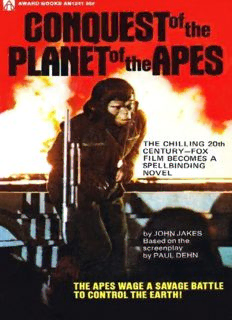Table Of ContentTHE TIME: 1990
THE PLACE: A gray, tightly computerized city-state, somewhere in North
America THE INHABITANTS: Apes who serve as terrified slaves. Men
who function as brutalized masters Until the Apes revolt . . . in a battle as
savage and monstrous as the bondage they’d been forced to endure for
decades!
20th Century-Fox Presents
An Arthur P. Jacobs Production
CONQUEST OF THE PLANET
OF THE APES
Starring
RODDY McDOWALL and DON MURRAY
and
RICARDO MONTALBAN
as Armando
Produced by
APJAC PRODUCTIONS
Directed by
J. LEE THOMPSON
Written by
PAUL DEHN
Based on Characters from
PLANET OF THE APES
Music by
TOM SCOTT
CONQUEST OF THE PLANET OF THE APES
FIRST AWARD PRINTING February 1974
Copyright © 1972, 1974 by
Twentieth Century-Fox Film Corporation.
All rights reserved
AWARD BOOKS are published by
Universal-Award House, Inc., a subsidiary of
Universal Publishing and Distributing Corporation,
235 East Forty-fifth Street, New York, N.Y. 10017
PRINTED IN THE UNITED STATES OF AMERICA
CONTENTS
Title
Copyright
CONQUEST OF THE PLANET
OF THE APES
Prologue
One
Two
Three
Four
Five
Six
Seven
Eight
Nine
Ten
Eleven
Twelve
Thirteen
Fourteen
Fifteen
Sixteen
Seventeen
Eighteen
PROLOGUE
Under a red-tinged moon, the dark towers of the central city thrust against the
sky. Black glass facades caught the moon’s reflection, sectioned it like so many
endlessly repeated blank faces.
Aerial walkways arched gracefully between the cubistic towers, empty at this
hour. From the buildings, and from intersections along the walkways, ramps led
down to the perimeter of a vast mall, a checkerboard of small green pocket parks
and paving blocks that reflected the moon from their mica flecks. There was no
sound except the tack-tacking of the boots of a helmeted state security policeman
walking along a parapet above the plaza. His rifle barrel glittered, slung over his
shoulder, muzzle upward.
The policeman drew in a breath of the cool, fresh air. Two years ago, in 1989,
the last of the huge air-scrubbing plants, constructed at a cost of billions along
the mountain chain a hundred miles eastward, had, in combination with stringent
laws, made it pleasant to breathe again—at least in this American city. The
policeman couldn’t speak for others, never having traveled much.
But he’d heard it was the same in all the great metro sprawls. An ordered
society. Law breakers—including polluters—were promptly, severely punished.
And the masses of people had been relieved of menial chores by the careful
conditioning of thousands of . . .
Abruptly, the policeman stiffened, cocked his head. His helmet flashed moon
reflections. Somewhere deep in the glass and steel canyons surrounding the mall,
he heard soft, urgent footfalls.
Then another sound made him glance quickly up and down the mall. The
second noise was—a jungle sound.
He had seen pictures of the world’s few remaining jungle places on solido
shows. The policeman reached up, slowly unslung his rifle. He was sure now.
What he’d heard was the whimpering cry of a frightened animal—a running
animal.
His face tense, the policeman headed for the nearest ramp. His boots clacked
as he ran down to the mall proper. He searched one direction, then another.
Nothing but shadows, glass, silence. The footfalls had stopped.
But in thicker shadow beneath another ramp angling down to the pavement far
on his right, he swore he heard the light, raspy sound of something breathing.
He whipped around as a shadowy figure broke from under the ramp. The
figure began to zigzag between the pocket parks in an unmistakable shambling
stride.
Almost before he realized it, the policeman was running himself. He
understood the nature of the humped silhouette; understood why it scurried so
rapidly across the plaza, dashing past building entrances, temporarily vanishing
behind ramp pillars, then plunging frantically on again.
High on another parapet to his left, he heard a word barked by a human voice,
then realized it was his own name, called out by a colleague who patrolled
blocks Q four through seven. Moving fast, trying to keep the fleeing figure in
sight, the first policeman shouted up to the other: “Runaway!”
The cause of the flight, or the identity of the fugitive, he did not know. But he
knew that what was happening violated their conditioning, and therefore could
not go unchecked. He breathed hard, gripping the rifle in a sweaty palm as he
ran. Finally the fleeing figure broke into plain sight, forced to cross a wide paved
area in order to reach the sanctuary of the streets opening from the mall’s far
side.
The state security policeman halted, braced his booted feet, brought the rifle
halfway to his shoulder. He yelled the command that carried more power—with
them—than lethal weapons:
“No!”
The echo bounced off the high buildings. And, for a moment, the fleeing
figure did react, break stride—almost hesitate. But ultimately, the traditional
command failed to work. The figure went shambling on, the emptiness flinging
back the whimpering, terrified sound it made.
“Jesus Christ,” said the policeman with a violent swallow. “A real renegade.”
His training had the rifle at his shoulder by then. With only an instant’s pause,
he squeezed the trigger. The first thunderous report was followed by a second.
The distant figure spun, toppled to the paving stones, flat on its back, arms
flung wide. It let out a piercing bellow of animal agony. The policeman had
never shot one of them before. There was a shock reaction as he dashed forward,
sourness rising in his throat. Coming down the ramp from above, the boots of his
colleague slammed like ghostly echoes of the shots.

